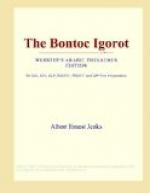After a while the man died. His friends came to the funeral, and a snake, o-wug’, also came. When the people wept, o-wug’ cried also. When they put the dead man in the grave, and when they stood there looking, o-wug’ came to the grave and looked upon the man, and then went away.
Later, when the friends observed the death ceremony, o-wug’ also came.
“O-wug’ thus showed himself to be a friend and companion of the Igorot. Sometime in the past he was an Igorot, but we have not heard,” the old men say, “when or how he was o-wug’.”
“We never kill o-wug’; he is our friend. If he crosses our path on a journey, we stop and talk. If he crosses our path three or four times, we return home, because, if we continue our journey then, some of us will die. O-wug’ thus comes to tell us not to proceed; he knows the bad anito on every trail.”
Who took my father’s head?
The Bontoc people have another folk tale regarding head taking. In it Lumawig, their god, taught them how to discover which pueblo had taken the head of one of their members. They repeat this story as a ceremony in the pabafunan after every head lost, though almost always they know what pueblo took it. It is as follows:
“A very great time ago a man and woman had two sons. Far up in the mountains they owned some garden patches. One day they told the boys to go and see whether the stone wall about the garden needed repair; but the boys said they did not wish to go, so the father went alone. As he did not return at nightfall, his sons started into the mountains to find him. They bound together two small bunches of runo for torches to light up the steep, rough, twisting trail. One torch was burning when they went out, and they carried the other to light them home again. Nowhere along the trail did they find their father; he had not been injured in the path, nor could they find where he had fallen over a cliff. So they passed on to the garden; there they found their father’s headless body. They searched for blood in the bushes and grass, but they found nothing — no blood, no enemies’ tracks.
“They carried the strange corpse down the mountain trail to their home in Bontoc. Then they hastened to the pabafunan, and there they told the men what had befallen their father. The old men counseled together, and at last one of them said: ’Lumawig told the old men of the past, so the old men last dead told me, that should any son find his father beheaded, he should do this: He should ask, “Who took my father’s head? Did Tukukan take it? Did Sakasakan take it?” ’ and Lumawig said, ‘He shall know who took his father’s head.’




